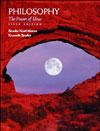| Anaxagoras | Maintained that all things are composed of infinitely divisible particles; the universe was cause by mind (nous) acting on matter.
|
 |
 |
 |
| Anaximander | Held that the original source of all things is a boundless, indeterminate element.
|
 |
 |
 |
| Anaximenes | Said that the underlying principle of all things is air.
|
 |
 |
 |
| A priori principle | A proposition whose truth we do not need to know through sensory experience and that no conceivable experience could serve to refute.
|
 |
 |
 |
| Atomism | The ancient Greek philosophy that holds that all things are composed of simple, indivisible minute particles.
|
 |
 |
 |
| Determinism | The doctrine that a person could not have acted otherwise than as she or he did act.
|
 |
 |
 |
| Dualism | Two-ism; the doctrine that existing things belong to one or another but not both of two distinct categories of things, usually deemed to be physical and nonphysical or spiritual.
|
 |
 |
 |
| Empedocles | Held that apparent changes in things are in fact changes in the positions of basic particles, of which there are four types earth, air, fire, and water. Two forces cause these basic changes love and strife.
|
 |
 |
 |
| Epistemology | The branch of philosophy concerned primarily with the nature and possibility of knowledge.
|
 |
 |
 |
| Metaphysics | The branch of philosophy that studies the nature and fundamental features of being.
|
 |
 |
 |
| Nous | A Greek word variously translated as "thinking," "mind," "spirit," and "intellect."
|
 |
 |
 |
| Parmenides | Said that the only reality is permanent, unchanging, indivisible, and undifferentiated being and that change and motion are illusions of the senses.
|
 |
 |
 |
| Pre-Socratic philosophers | Greek philosophers who lived before Socrates.
|
 |
 |
 |
| Principle of reason | An a priori principle.
|
 |
 |
 |
| Pythagoras | Maintained that enumerability constitutes the true nature of things.
|
 |
 |
 |
| Pythagoreans | Pythagoras and his followers, whose doctrine - a combination of mathematics and philosophy - gave birth to the concept in metaphysics that fundamental reality is eternal, unchanging, and accessible only to reason.
|
 |
 |
 |
| Thales | Held that the basic stuff out of which all else is composed is water.
|
 |
 |
 |
| The Atomists (especially Leucippus and Democritus) | Said that all things are composed of imperceptible, indestructible, indivisible, eternal, and uncreated atoms. Motion needs no explanation.
|
 |
 |
 |
| Zeno | Devised clever paradoxes seeming to show that motion is impossible.
|



 2002 McGraw-Hill Higher Education
2002 McGraw-Hill Higher Education

 2002 McGraw-Hill Higher Education
2002 McGraw-Hill Higher Education